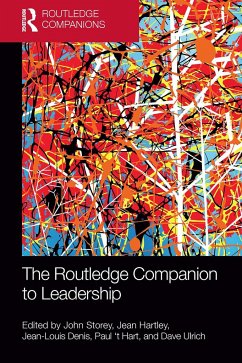
The Routledge Critical Companion to Leadership Studies
Versandkostenfrei!
Versandfertig in 6-10 Tagen
230,99 €
inkl. MwSt.
Weitere Ausgaben:

PAYBACK Punkte
115 °P sammeln!
The Routledge Critical Companion to Leadership Studies offers a rich and insightful overview of critical leadership studies for students, teachers, researchers, and practitioners. The volume draws together 35 chapters from 56 authors who represent the vibrant diversity of the critical leadership community. It includes chapters from emerging and preeminent scholars who share an interest in directing leadership theorizing, development and practice toward the aims of liberation, justice, and equity.The Companion is organized into six themes: (1) philosophical perspectives on leadership; (2) proce...
The Routledge Critical Companion to Leadership Studies offers a rich and insightful overview of critical leadership studies for students, teachers, researchers, and practitioners. The volume draws together 35 chapters from 56 authors who represent the vibrant diversity of the critical leadership community. It includes chapters from emerging and preeminent scholars who share an interest in directing leadership theorizing, development and practice toward the aims of liberation, justice, and equity.
The Companion is organized into six themes: (1) philosophical perspectives on leadership; (2) processes, practices, and power dynamics in leadership; (3) diversity and leadership; (4) leadership education and development; (5) lessons from the dark side of leadership; and (6) reimagining leadership and leadership studies.
The book has been curated to serve as a "go to" resource for undergraduate and postgraduate students, academic staff, and researchers seeking to understand the current state of play on a given topic, as well as inspiration for how they might contribute to its development. Each chapter provides a comprehensive yet succinct review of contemporary literature and offers the reader avenues for future research. Leadership practitioners will also find provocative ideas among these pages to help them interrogate and transform the ways they lead.
The Companion is organized into six themes: (1) philosophical perspectives on leadership; (2) processes, practices, and power dynamics in leadership; (3) diversity and leadership; (4) leadership education and development; (5) lessons from the dark side of leadership; and (6) reimagining leadership and leadership studies.
The book has been curated to serve as a "go to" resource for undergraduate and postgraduate students, academic staff, and researchers seeking to understand the current state of play on a given topic, as well as inspiration for how they might contribute to its development. Each chapter provides a comprehensive yet succinct review of contemporary literature and offers the reader avenues for future research. Leadership practitioners will also find provocative ideas among these pages to help them interrogate and transform the ways they lead.














